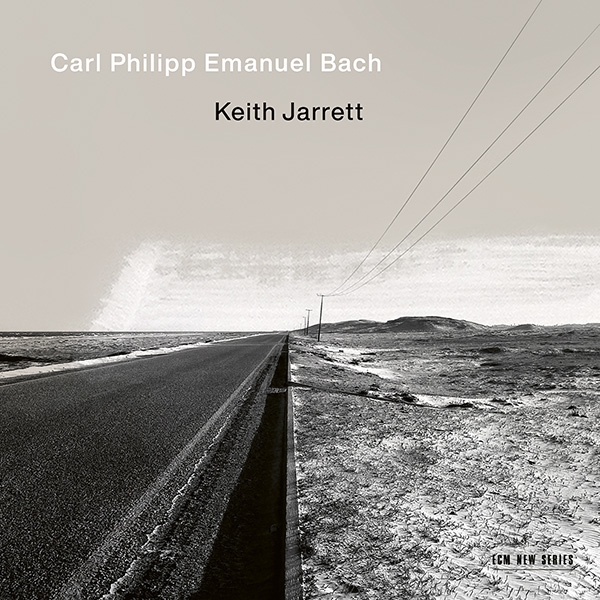| Columns Retired Columns & Blogs |
This particular Mahler's 5th is outstanding. I have heard it twice and consider it a top performance. There are many good ones to choose from, too many to mention here, but the MSO should be proud of this recording.

Jazz pianist Keith Jarrett developed an interest in classical music midcareer, performing music by J.S. Bach and Shostakovich—whose linear styles he presumably found congenial. From the booklet: "I heard the Württemberg Sonatas recorded by harpsichordists, and I felt there was space for a piano version." He recorded them in 1994. This is their first release.
Carl Philipp Emanuel Bach occupies a transitional position. His music, unlike his renowned father's, is very much of the Classical period but with retrospective formal and contrapuntal elements. Each sonata is cast in three movements. The writing alternates between back-and-forth counterpoint in sparse Baroque-ish textures and Haydnesque chordal chugging, with minor keys that hint at Mozartean drama. Many melodic lines incorporate elaborate decoration, pointing the way to Bellini's vocal lines and Chopin's instrumental ones. The composer pivots expertly between these disparate elements; the last two of the six, each beginning with an elaborate French overture, are the most backward-looking.
A good jazz player needs dexterous fingers—think of those improvisations—and Jarrett has digital technique to spare. The various little scales, turns, and trills are uniformly articulate and limpid, equally balanced between hands. He inflects the themes easily and smoothly, following the phrase shapes, and draws expressive tension from numerous short-term cross-relations, minor to major and back. His rhythmic address is astute; some of the duple movements have a hearty lilt recalling Dad's Italian Concerto.
A few details provoke carping: Jarrett's heavy-handed treatment of the syncopations in the Second, and an overloud chorale in the Adagio of the Sixth. I didn't notice the engineering—high praise indeed. This is delightful.—Stephen Francis Vasta

Mahler: Symphony No.5
Orchestre symphonique de Montréal, Rafael Payare, cond.
Pentatone PTC5187067 (CD, reviewed as 24/96). 2023. Martin Sauer, Carl Talbot, prods.; Richard King, eng.
Performance *****
Sonics ****½
The choice of recordings for Mahler's Symphony No.5 in C-sharp minor is huge, including benchmarks from Bernstein, Rattle, Barbirolli, Abbado, and more. Yet for those who may ask do we need another Mahler Fifth, Rafael Payare and the Montreal Symphony Orchestra supply a resounding "Yes!"
The recording may lack ultimate transparency, but it nonetheless abounds in color and life, the performance in clarity of line. Payare's forces supply wrenching drama (movement one), heartache and healing (the glorious Adagietto), and triumphant resolution (the finale). This performance, at a touch over 68 minutes, doesn't just move along; it sweeps us up, churns us about, and deposits us exhilarated and fresh.
We may not wish to confess our sins, but we all have guilty pleasures. For example, as concerned as I may be about the sum total of vocal artistry, I feel disappointed if I don't hear a strong, well-sustained high E-flat at the end of Verdi's "Sempre libera." Similarly, for many Mahler lovers, including me, it's the great, oft-excerpted Adagietto that makes or breaks a recording of Symphony No.5.
Payare's launch into Mahler's heart-tugging theme may be faster than some, but there's a reason. His bridge, which dips deeply into heartache and despair without ever growing maudlin, draws you in so completely that when it slows down to allow the theme to begin anew, all separation between you and Mahler's soul dissolves. Payare's slower, gentler, wondrous reprise washes over us like an emotional balm, preparing us for the triumph to follow.
Once you experience his brand of musical magic, you'll likely add Payare to your list of conductors you regularly turn to, especially in Mahler, conductors who channel Mahlerian miracles through outstretched arms.—Jason Victor Serinus

Schubert: Symphonies Nos.5 & 7 (Unfinished)
Freiburger Barockorchester, Pablo Heras-Casado, cond.
Harmonia Mundi HMM 902694 (CD). 2023. Martin Sauer, prod.; Julian Schwenkner, eng.
Performance ****
Sonics ***½
The Freiburg Baroque Orchestra may seem oddly cast in Schubert symphonies, but they prove equal to the task. The booklet lists no fewer than 15 violins—comparable numbers to a modern chamber orchestra. The problem here is that Heras-Casado doesn't maintain a consistent point of view.
The Fifth's vernal opening bars belie a brisk, bracing performance. Textures are clear, with clipped phrase endings. In the development, though, woodwinds nervously jump rests, pushing ahead. The Andante, simple and flowing, sings naturally. The taut, gripping Menuetto feels like a Beethoven scherzo, with a relaxed, slightly rustic Trio; the conductor alertly observes the mood pivots between phrases. The merry, bustling finale becomes taut and grippingly dramatic in the minore sections. The only signs of "period" timbres come in some exposed afterbeats, a few chunky bassoon attacks, and the Andante's thin, straight-toned pickups.
In the more conventional Unfinished, the distinctive timbres stand out more: Reedy strings dominate the famous theme's afterbeats, with the wind doublings held down. After a cushiony, mysterious opening, the first movement moves moderately, though the players rather "slam" the first big sforzando; in the coda, the conductor turns the phrases and leans into the accents with a sure dramatic sense. Unfortunately, a blatant wrong note in the big chord at 2:02 spoils things—and, no, this isn't the notorious "wrong" note in the manuscript (which Heras-Casado also plays, like everyone else nowadays). The Andante's opening unfolds graciously; like its counterpart in the Fifth, it's simple and flowing, proceeding in a single arc to a cautiously optimistic finish.
The sonics are fine; I attribute the occasional edgy tutti to the overeager playing rather than the engineering. Shame about that wrong note, though.—Stephen Francis Vasta

Robert Schumann: Dichterliebe • Kerner Lieder
Florian Boesch, baritone; Malcolm Martineau, piano
Linn CKD695 (CD, reviewed as 24/96). 2023. Philip Hobbs, prod. & eng.
Performance *****
Sonics ****½
One of my greatest lieder experiences occurred when Florian Boesch performed Schubert's Der Winterreise in Sonoma County, California. Conceiving of the cycle as the final chapter in the life of a clinically depressed man, Boesch sang all 16 songs without affect, in an unwavering, lifeless tone. Person after person left the hall, finding Boesch's emotional message too difficult to sit through. Then he took the same performance to Carnegie Hall, where the reception was enthusiastic and Jim Oestreich of the New York Times hailed it as the most brilliant performance of the season.
More than a decade later, Boesch proves equally brilliant and similarly fearless in this recording. With a voice sometimes filled with masculine thrust, at other times so soft and sensitive that it barely sounds, he brings insight after insight to two of Schumann's greatest song collections. Whether you agree with all his decisions or find some of them unsettling, the depth of his sincerity and intelligence are beyond question. Boesch may not paint every other word differently, as Fischer-Dieskau often did, but he cares about this material so deeply that he gives it every bit of his attention. Yet, as intense and focused as his singing may be, he never sounds remotely self-conscious; rather, he seems so immersed in the music of Schumann and the poetry of Heine (Dichterliebe) and Kerner that he and the protagonists of these songs become one.
Listen, for example, to the final song of Dichterliebe. As the singer buries his bad and bitter dreams, his love and his sorrow, in a huge coffin, Boesch's ritard conveys utter finality. Silence reigns before Martineau, totally of one mind with the singer, delivers the most poetic of postludes. Together, these men gift us with artistic brilliance at its peak.—Jason Victor Serinus

This particular Mahler's 5th is outstanding. I have heard it twice and consider it a top performance. There are many good ones to choose from, too many to mention here, but the MSO should be proud of this recording.